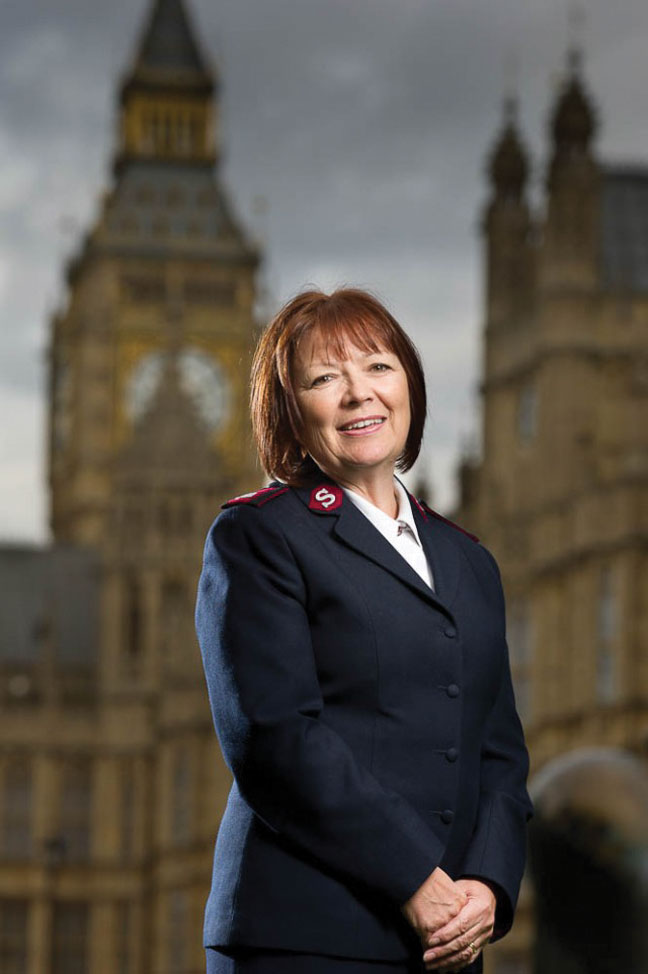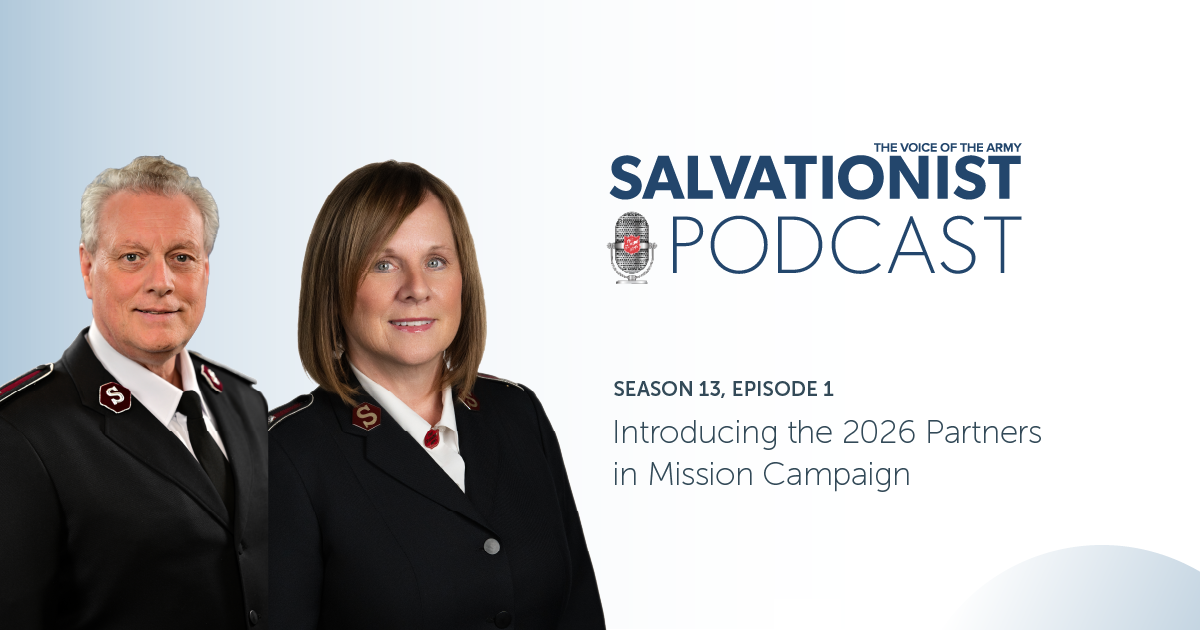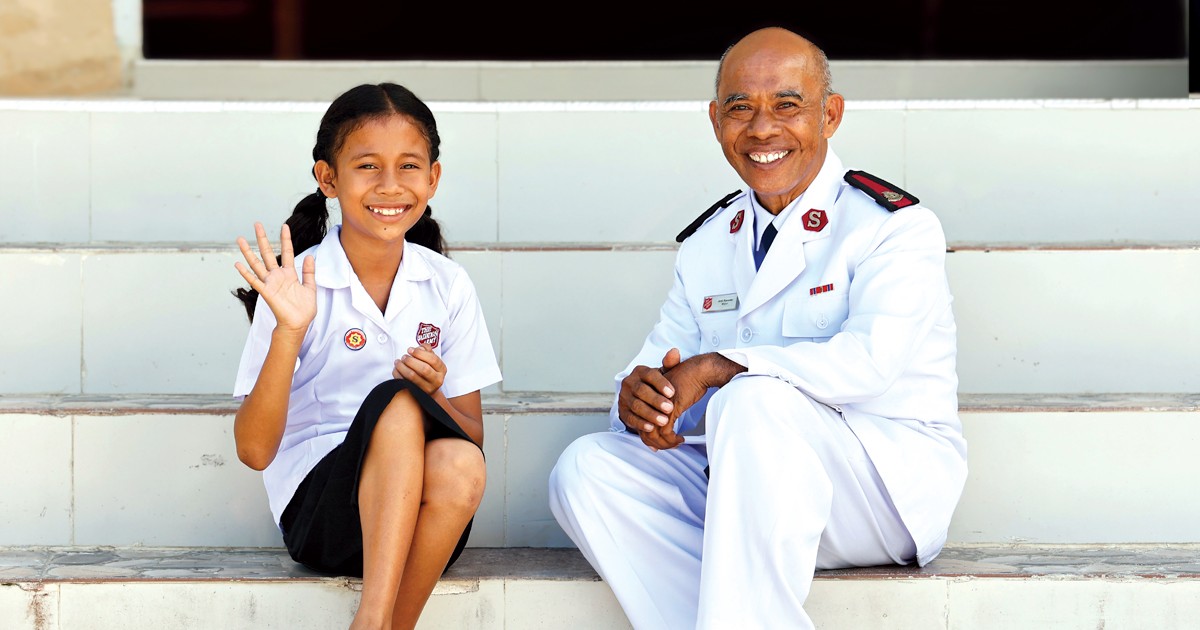It is estimated that more than two million people are trafficked across international borders annually. But in the United Kingdom, a destination country for victims, The Salvation Army is taking a stand, helping hundreds of people escape exploitation each year. Major Anne Read, anti-trafficking response co-ordinator in the United Kingdom Territory with the Republic of Ireland, explains the Army's crucial anti-trafficking program to Kristin Ostensen, Salvationist's associate editor.
What kind of anti-human trafficking work is the Army doing in the U.K.?
For the last three years, The Salvation Army has been the government contract-holder managing all of the support for adult victims of human trafficking in England and Wales. The Army manages the delivery of all services, working with 11 other organizations, so we've got a spectrum of types of support and can try to match each of the victims with a particular service.
We also provide training for police, social services, border agencies, health authorities—anyone who might encounter a victim of trafficking. We really want front-line agencies to know that if they believe somebody has been trafficked, there is somewhere for them to go. We have a 24-7 referral line. The potential victim of trafficking will be picked up by volunteers and taken to safe accommodation where they will receive support.
Are Salvation Army corps involved in this work?
One of the best things about having the contract is that Salvationists and corps members can become actively involved in supporting victims of human trafficking in practical ways. When we get the referrals the first thing we do is make an assessment of the victim's needs and decide where is the best place for that victim to go. Our volunteers will then go to the places from which they've been referred and transport the victim to a place of safety. This is putting hands and feet on our prayers. For many of the victims, this is the first time that someone has shown them kindness and compassion in a long time. That kindness can be extremely important in helping the victim to realize that this is not just a safe house, but the start of a journey to hope and a future for them.
Are there groups of people who are particularly vulnerable to being trafficked?
That's exactly it: wherever people are vulnerable, for whatever reason, they are open to this kind of exploitation. Any kind of poverty makes people open to trafficking. And being trafficked doesn't have to involve borders. A simple explanation of trafficking is that people are tricked into believing that there's an opportunity for them, a better life for them, and then they are transported and trapped. They can be trapped physically by bolts and locks, but often they're trapped by threats—against themselves and their families. They're living fearful for their lives and while they're in that situation the degree of exploitation can be very severe.
Do you have any success stories you can share with us?
We assisted a woman named Miriam, who left her family in Uganda to come to the U.K. and try and earn a living to support them. When she arrived, she was put in a room and the person who took her told her, “I'm going to bring a man in to see you and I want you to do anything he wants.” From there, she was forced to have sex with men up to six times a day, every day. That went on for years until one day she saw the opportunity to escape. She was found in a park and taken to the police who referred her to us. She came into our safe house and now she's living independently. She wants to study and hopes that her children will be able to join her soon here, but having lost many of her family in the Ugandan genocide, she now says that The Salvation Army is her family.
Are there lessons Canada can learn from what the Army is doing in the U.K.?
I think we've all got a lot to learn from each other. As we speak together, we can think about how we can respond, as individuals and communities, and encourage people to actually stand up and do something. If we can generate the conversation whereby we're all of the same mind—that we must stop the trafficking of human beings—then I believe that we can make a difference.
Major Anne Read will lead a workshop on human trafficking at Territorial Congress 2014. See salvationist.ca/congress2014 for details.
What kind of anti-human trafficking work is the Army doing in the U.K.?
For the last three years, The Salvation Army has been the government contract-holder managing all of the support for adult victims of human trafficking in England and Wales. The Army manages the delivery of all services, working with 11 other organizations, so we've got a spectrum of types of support and can try to match each of the victims with a particular service.
We also provide training for police, social services, border agencies, health authorities—anyone who might encounter a victim of trafficking. We really want front-line agencies to know that if they believe somebody has been trafficked, there is somewhere for them to go. We have a 24-7 referral line. The potential victim of trafficking will be picked up by volunteers and taken to safe accommodation where they will receive support.
Are Salvation Army corps involved in this work?
One of the best things about having the contract is that Salvationists and corps members can become actively involved in supporting victims of human trafficking in practical ways. When we get the referrals the first thing we do is make an assessment of the victim's needs and decide where is the best place for that victim to go. Our volunteers will then go to the places from which they've been referred and transport the victim to a place of safety. This is putting hands and feet on our prayers. For many of the victims, this is the first time that someone has shown them kindness and compassion in a long time. That kindness can be extremely important in helping the victim to realize that this is not just a safe house, but the start of a journey to hope and a future for them.
Are there groups of people who are particularly vulnerable to being trafficked?
That's exactly it: wherever people are vulnerable, for whatever reason, they are open to this kind of exploitation. Any kind of poverty makes people open to trafficking. And being trafficked doesn't have to involve borders. A simple explanation of trafficking is that people are tricked into believing that there's an opportunity for them, a better life for them, and then they are transported and trapped. They can be trapped physically by bolts and locks, but often they're trapped by threats—against themselves and their families. They're living fearful for their lives and while they're in that situation the degree of exploitation can be very severe.
Do you have any success stories you can share with us?
We assisted a woman named Miriam, who left her family in Uganda to come to the U.K. and try and earn a living to support them. When she arrived, she was put in a room and the person who took her told her, “I'm going to bring a man in to see you and I want you to do anything he wants.” From there, she was forced to have sex with men up to six times a day, every day. That went on for years until one day she saw the opportunity to escape. She was found in a park and taken to the police who referred her to us. She came into our safe house and now she's living independently. She wants to study and hopes that her children will be able to join her soon here, but having lost many of her family in the Ugandan genocide, she now says that The Salvation Army is her family.
Are there lessons Canada can learn from what the Army is doing in the U.K.?
I think we've all got a lot to learn from each other. As we speak together, we can think about how we can respond, as individuals and communities, and encourage people to actually stand up and do something. If we can generate the conversation whereby we're all of the same mind—that we must stop the trafficking of human beings—then I believe that we can make a difference.
Major Anne Read will lead a workshop on human trafficking at Territorial Congress 2014. See salvationist.ca/congress2014 for details.










Leave a Comment